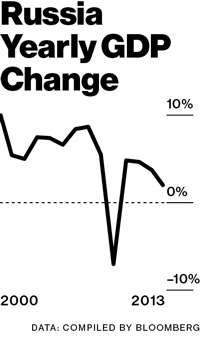 Anyone who remembers UNC professor Peter Coclanis‘ 2009 presentation to the John Locke Foundation’s Shaftesbury Society on challenges facing the Russian society will have an easy time believing the details in this Bloomberg Businessweek article.
Anyone who remembers UNC professor Peter Coclanis‘ 2009 presentation to the John Locke Foundation’s Shaftesbury Society on challenges facing the Russian society will have an easy time believing the details in this Bloomberg Businessweek article.
Elena Sokolova, who owns a cafe in downtown Moscow, says she’s had enough of President Vladimir Putin’s Russia and the arbitrary ways of the government. After the Russian leader seized Ukraine’s Crimea peninsula, sparking the worst geopolitical standoff since the Cold War, she and her family applied for residency in Bulgaria, a member of the European Union. “I can’t live without Russia—I love it,” she says. “But I’m really frightened at what’s going on in our country right now. Anything can happen to me or my business, so I need the chance to get out of here, maybe forever.”
As Russia’s ties with the West and its business climate deteriorate, the world’s largest energy exporter risks years of slow growth that could deepen its dependence on oil and gas and strengthen the state’s dominance of the economy. “Even before Crimea there was a slowdown,” says Sergei Guriev, a leading Russian economist and Putin critic who fled Russia for France last year and teaches at Sciences Po in Paris. “Now there are huge negative implications for the Russian economy as isolation will continue and worsen.” …
… The tensions over Crimea are the latest in a long list of problems that have led to economic slowdown and capital exodus. The expansion of Russia’s $2 trillion economy decelerated for a fourth year in 2013, after consumer spending fell and investment sagged along with demand for energy. State-run VTB Capital forecasts the economy will post zero growth this year. Russia is the world’s most corrupt major economy, ranking alongside Pakistan and Nicaragua at 127 out of 176 nations in the annual Corruption Perceptions Index compiled by Transparency International. Educated middle-class Russians such as Sokolova are voting with their feet. In recent weeks, inquiries by professionals from Russia seeking refuge in eastern Europe have jumped, says Katya Ponomareva, who runs a consultancy on investments in Latvia and Bulgaria.


